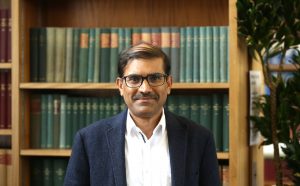Keynotes
Sanjeev Goyal
Cambridge University and NYUAD

Title: Interconnected Conflict
Sanjeev Goyal is the Arthur Pigou Professor of Economics and Fellow of Christ’s College, Cambridge. He is best known for his pioneering research in networks.
Sanjeev’s research in the 1990’s laid the foundations for an economic approach to the study of networks by providing a framework for the study of the effects of social structure on human behaviour and by developing a model of how the costs and benefits of linking shape the formation of networks. In subsequent work, he has explored ways in which individuals, firms, and governments can use networks to better attain their objectives.
Using a combination of theoretical models, laboratory experiments, and observational data, his research helps us better understand the origins of unequal and small world networks; the persistence of diverse opinions and incorrect beliefs; optimal targeting of taxes/subsidies when firms have market power; the defense and design of networks that face threats; the relation between communities, state and markets; the social structure origins of trust; and collaboration and competition among firms and among researchers.
Sanjeev has lectured widely and enjoys writing. His first book, “Connections: an introduction to the economics of networks” was published in 2007 by Princeton University Press. A second book Networks: An Economics Approach was published by MIT Press in April 2023.
Sanjeev has mentored over forty doctoral students and post-doctoral fellows, many of whom have gone on to become international leaders in research, senior managers in international and national organizations, and partners in top consultancy organizations.
Sanjeev Goyal is a Fellow of the British Academy, a Fellow of the Econometric Society, and a Council Member of the Game Theory Society. He was the Founding Director of the Cambridge-INET/Janeway Institute 2012-2014, and Chair of the Economics Faculty at Cambridge 2014-2018.
Tamer Basar
University of Illinois Urbana-Champaign

Tamer Başar received his B.S.E.E. from Robert College, Istanbul, and M.S., M.Phil., and Ph.D. degrees in engineering and applied science from Yale University. After positions at Harvard University, the Marmara Research Institute (Gebze, Turkey), and Boğaziçi University (Istanbul), he joined the University of Illinois Urbana-Champaign in 1981, where he is currently Swanlund Endowed Chair Emeritus; CAS Professor Emeritus of ECE; and Research Professor at CSL and ITI. At Illinois, he has served as Director of the Center for Advanced Study (2014–2020), Interim Dean of Engineering (2018), and Interim Director of the Beckman Institute (2008–2010). He is a member of the US National Academy of Engineering and a Fellow of the American Academy of Arts and Sciences, as well as a Fellow of IEEE, IFAC, SIAM, and AAAI. He has served as President of the IEEE Control Systems Society (CSS), Founding President of the International Society of Dynamic Games (ISDG), and President of the American Automatic Control Council (AACC).
Over the years, he has received several awards and recognitions, including the IEEE CSS Bode Lecture Prize (2004), IFAC’s Quazza Medal (2005), AACC’s Bellman Control Heritage Award (2006), ISDG’s Isaacs Award (2010), the IEEE Control Systems Technical Field Award (2014), the Medal of Science of Turkey (1993), the IEEE Millennium Medal (2000), and the Wilbur Cross Medal from his alma mater Yale University (2021). He has also received honorary doctorates and professorships from several international institutions, including KTH Royal Institute of Technology (Stockholm); Tsinghua, Shandong, and Northeastern Universities (China); Boğaziçi and Doğuş Universities (Istanbul); and the NAS of Azerbaijan. He served as Editor-in-Chief of the IFAC Journal Automatica from 2004 to 2014 and is currently an editor for several book series. He has made substantial contributions to the fields of systems, control, communications, optimization, networks, and dynamic games, and is ranked sixth in the world by ScholarGPS for lifetime contributions to Game Theory.
His current research interests include stochastic teams, games, and networks (with finite- and infinite-population models); multi-agent systems and learning; data-driven distributed optimization; epidemic modeling and control over networks; strategic information transmission, the spread of disinformation, and deception; security and trust; energy systems; and cyber-physical systems.

